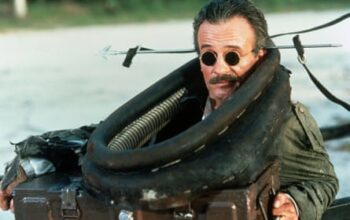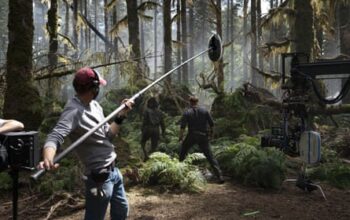B
Actor and singer Billy Porter is well-known for taking on bold and dynamic roles. He earned recognition for his captivating portrayal of Pray Tell, the energetic drag ball host, in the FX drama series Pose, and received an Emmy award for his performance. In the 2021 reimagining of Cinderella by Amazon, he transformed the traditional fairy godmother into a fierce and sassy “godmuvva”, as he likes to call it. In his latest project, the relationship drama Our Son directed by Bill Oliver, Porter takes on a different type of character as Gabriel, a timid stay-at-home father going through a divorce with his husband, Nicky (played by Luke Evans). This role requires Porter to portray vulnerability, pain, and at times, resentment, without the glitz and glamour associated with his more well-known characters.
This is the type of role that Porter was always confident he could excel in, but has seldom been offered the opportunity. He believes that even his fans struggle to fully grasp it. During the premiere, someone asked him how he managed to pull off his performance, to which he responded, “Would you ask Viola Davis or Al Pacino that question?” Society struggles to accept that someone can embody both flamboyance and gravity – but Porter is living proof.
Just so you know, yes – this is essentially how Porter speaks all the time. During our 45-minute interview, he compares himself to four-time Oscar nominee Viola Davis three times; he adds the word “doll” when discussing a ceasefire in the Middle East. From his Zoom call in a hotel room in Florida, he appears to be a natural speaker, delivering each answer as if he’s addressing a large audience. His charm, which propelled him to stardom on television and Broadway, shines brightly.
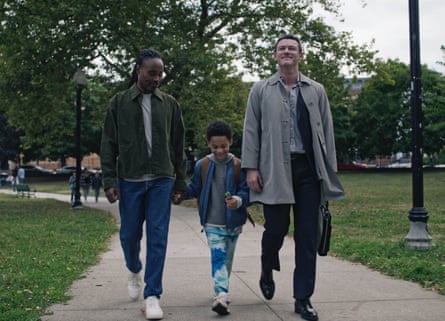
However, with Our Son, Porter was finally able to fully showcase his acting skills on screen. He found it relatively simple to get into character, as he could relate to the complexities of being married. Despite being discreet about his personal life during our conversation, he did mention that while working on the project, his personal life seemed to mirror the plot of the film. He shared that at the time, he was married but now he is not, and he knew that this would likely be the outcome during filming. However, his divorce with his spouse of six years, Adam Smith, was not as amicable as the separation between Gabriel and Nicky’s characters in the movie.
Gabriel exemplifies the intricate and diverse type of queer character that Porter had envisioned portraying during his struggle to establish himself as an actor in the 1990s. Originally from Pittsburgh, Pennsylvania, he completed his education at Carnegie Mellon University’s College of Fine Arts in the early 90s before relocating to New York. He soon discovered that complex roles for Black performers were scarce, and his breakthrough role ended up being the Teen Angel in the 1994 Broadway production of Grease. This did not align with his desire for multifaceted opportunities. Reflecting on his experience, he remembers, “I was decked out in 14 inches of bright orange rubber hair, prancing around like a Little Richard automaton on crack. I felt like a clown.”
He came to the realization that in order to pursue work that he found fulfilling, he would have to change people’s mindset. This would require effort and dedication on his part. He looked to actress Viola Davis as an inspiration, describing her as someone he knows and has worked with, although their relationship is not clearly defined. He sees her as proof that a talented Black performer can succeed in the restrictive Hollywood industry.
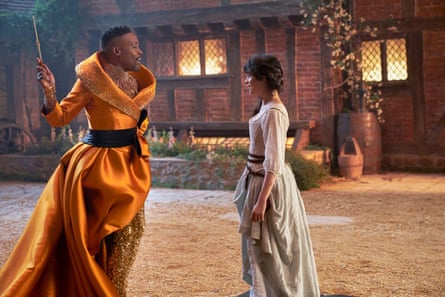
“She portrayed various roles of crack-addicted mothers, drug addict’s mothers, and typical dark-skinned Black women, and she portrayed those characters with grace and respect. This inspired me to follow in her footsteps.” He made the decision to not be limited by society’s expectations and stereotypes in the entertainment industry. Instead, he chose to give dignity and value to queer roles, and hoped that when the industry was ready, he would be the top choice for a complex and nuanced role for a Black gay man.
A
At this juncture, Porter has been employed in the entertainment industry for over three decades and has witnessed significant changes as the industry has shifted its focus to streaming. During the Screen Actors Guild (Sag) strike last year, he was a vocal critic of studio executives such as Disney’s Bob Iger, who dismissed the striking workers’ demands as unreasonable. Porter also shared that the strike’s impact was so concerning that he had to sell his house in fear of being unable to afford it. Although the strike has been resolved for a few months now, he still holds the belief that Sag and the Alliance of Motion Picture and Television Producers (AMPTP) came to favorable terms, but he remains upset that the consequences and aftermath continue to affect the workers and not the top-level decision-makers.
Our agreements are disappearing, our positions are disappearing, there is downsizing across the board, but those in the upper management are still profiting,” he asserts. He remains dissatisfied with the lack of responsibility for “the individuals who were in charge of running the company into the ground.” “Who should be held accountable for the company’s inability to sustain itself and its impending collapse?” he questions, his gaze stern behind his thick-framed spectacles. “The rise of streaming has greatly diminished the profits of artists and our ability to partake in capitalism. As artists, we are constantly working as freelancers and often find ourselves in blue-collar situations.”
According to Porter, the delay in streamers renegotiating with Sag-Aftra has led to a decreasing middle class among actors who are working. He expressed frustration at the fact that some actors, such as those from the show Friends, are making huge amounts of money while he receives measly six-cent checks. This situation is unacceptable.
Despite being considered successful and multi-talented, Porter acknowledges that he is fortunate to have multiple streams of income. He is not solely reliant on acting, as he also has a new album released under Republic records and the opportunity to return to Broadway if needed. However, he wants to clarify that he is still a dedicated working actor. He addresses the misconception that all actors are wealthy, revealing that his income from starring in Cinderella was only enough to cover his mortgage for four months. Porter adds that despite his achievements in the entertainment industry, he is one award away from achieving an EGOT (Emmy, Grammy, Oscar, Tony) and is wary of the risks and financial insecurity that comes with being an actor.
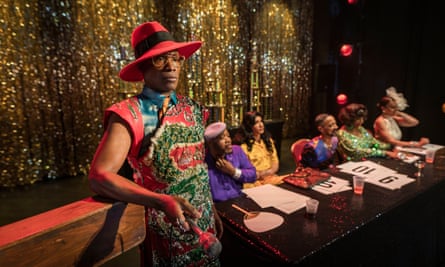
Display the image in full screen mode.
Porter is a versatile artist, excelling in multiple fields such as acting, singing, and directing. In 2022, he made his directorial debut in the teen film Anything’s Possible, available on Amazon Prime. The film centers around a transgender high school student. During a lull in his career in his early 30s, Porter took a screenwriting course at the University of California, Los Angeles. Now, he is utilizing those skills in co-writing a biopic about the life of the groundbreaking writer and activist, James Baldwin. Not only is he co-writing the film, but he will also star in it. When asked about his motivation for taking on such a project, Porter simply states, “If not me, then who? I refuse to continue waiting for someone else to tell the stories of influential Black and queer individuals like Langston Hughes and James Baldwin. It’s time for me to take charge and tell these important stories myself.” He brims with confidence as he adds, “As a Black gay man living in today’s world, I am the perfect person to bring this story to life. It’s a story that needs to be told, and I am grateful to have the opportunity to tell it.”
Porter explains that Baldwin’s story could not have been shared previously because no one cared. However, executives now understand the potential for profit in catering to marginalized audiences. Porter believes that as long as there is money involved, executives will pay attention, regardless of the specific group being represented. This idea seems to make sense to Porter, but it may not be easily explained aloud. He suggests acknowledging that the only color that matters in this context is green, not black, white, yellow, or Muslim.
Inspired by seeing his former co-star Greta Gerwig achieve box office success with her female-oriented film “Barbie,” the actor hopes to do the same with his own Black queer stories. He acknowledges the business aspect of show business and recognizes that Gerwig’s film was able to secure funding due to its marketability. He is currently navigating how to make similar successes with his own projects while also keeping in mind the importance of the business side of the industry.
Porter describes his Baldwin biopic as “sprawling”, and says that a piece of the novelist’s writing will be used as a framing device through which to explore his whole life. Baldwin, of course, was a strong advocate for the rights of Palestinians; Porter has been staunchly supportive of Israel in the past, opposing the cultural boycott of a film festival in Tel Aviv in 2021, and he was one of 700 celebrities who signed an open letter last year asking Hollywood to support Israel in its retaliation against Gaza after Hamas’s attack on 7 October.
In the script, I inquired about how Porter intends to handle Baldwin’s connection with the Palestinian rights movement, considering his own endorsement of Israel. Without hesitation, he clarifies his stance by stating, “My primary support lies with a two-state resolution and secondly, this issue is not my ultimate concern, and I am not willing to firmly stand by it. It does not pertain to me! I am not of Jewish or Palestinian descent,” he explains. “The ongoing events in that region are appalling – America’s choices have been misguided. Please do not use me as an example for this. I am not knowledgeable enough to actively participate in the discussion.”
“I stand with both my Jewish and Palestinian friends,” he states. “The ongoing conflict over there has been unresolved for centuries. I cannot fully comprehend it.” He lets out a anxious laugh. “What I am certain of is that we must put an end to the bombings. We need to stop that. And as for the group responsible, are they called the extremists?”
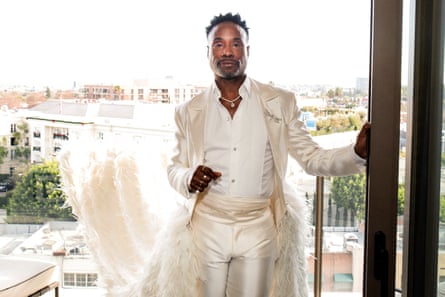
Hamas?
“Thank you for understanding. I am not familiar with all the details, but I do know that the extremists caused something terrible to happen and then there was a strong response. However, I feel like the response was excessive. It makes me question why we are constantly at war, not just in this situation but in the world in general. It pains me to see this and I am at a loss for words. All I can do is offer my condolences and ask how we can work towards a resolution. I strongly believe in peace.”
Porter becomes increasingly agitated during our conversation, but quickly regains his composure. He clarifies that he is not trying to imitate James Baldwin, but rather stay true to his character. As a result, he cannot speak to what Baldwin may have said about the Israel-Palestine conflict in previous decades, as he is focused on portraying Baldwin’s civil rights activism in America.
The allotted time has ended and Porter expresses gratitude to me for posing the question. He mentions that his Instagram has been bombarded with individuals expressing “Free Palestine”. He goes on to state, “I’ve been receiving a lot of nonsense online about it – I’m just like, ‘I don’t know, people!’. The individual in question has been deceased since 1987, so please let it go.” As always, it was an eventful ending.
Source: theguardian.com
